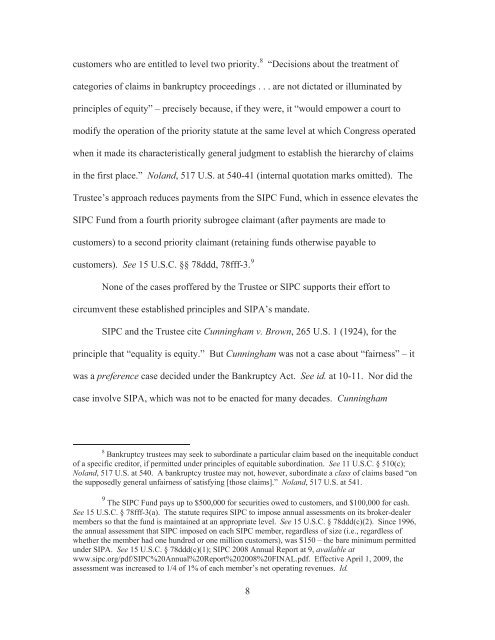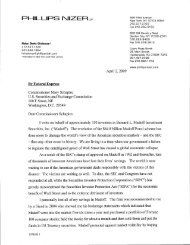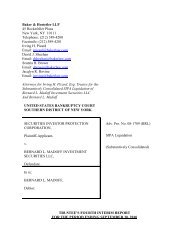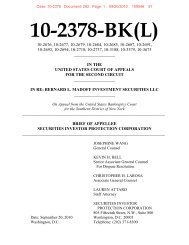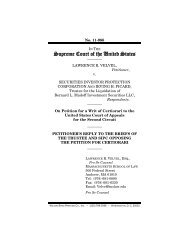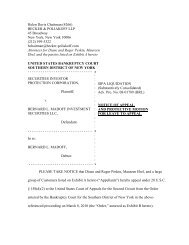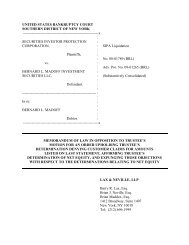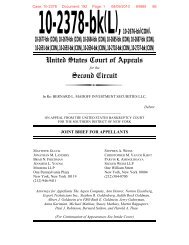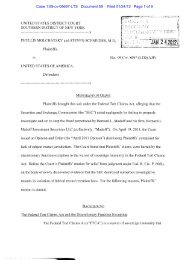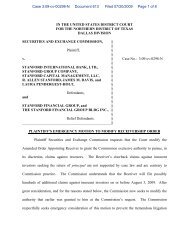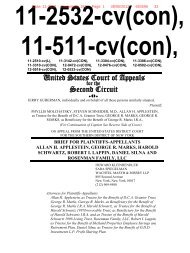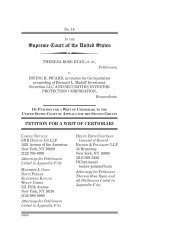Davis Polk & Wardwell LLP 450 Lexington Avenue New York, New ...
Davis Polk & Wardwell LLP 450 Lexington Avenue New York, New ...
Davis Polk & Wardwell LLP 450 Lexington Avenue New York, New ...
Create successful ePaper yourself
Turn your PDF publications into a flip-book with our unique Google optimized e-Paper software.
customers who are entitled to level two priority. 8<br />
“Decisions about the treatment of<br />
categories of claims in bankruptcy proceedings . . . are not dictated or illuminated by<br />
principles of equity” – precisely because, if they were, it “would empower a court to<br />
modify the operation of the priority statute at the same level at which Congress operated<br />
when it made its characteristically general judgment to establish the hierarchy of claims<br />
in the first place.” Noland, 517 U.S. at 540-41 (internal quotation marks omitted). The<br />
Trustee’s approach reduces payments from the SIPC Fund, which in essence elevates the<br />
SIPC Fund from a fourth priority subrogee claimant (after payments are made to<br />
customers) to a second priority claimant (retaining funds otherwise payable to<br />
customers). See 15 U.S.C. §§ 78ddd, 78fff-3. 9<br />
None of the cases proffered by the Trustee or SIPC supports their effort to<br />
circumvent these established principles and SIPA’s mandate.<br />
SIPC and the Trustee cite Cunningham v. Brown, 265 U.S. 1 (1924), for the<br />
principle that “equality is equity.” But Cunningham was not a case about “fairness” – it<br />
was a preference case decided under the Bankruptcy Act. See id. at 10-11. Nor did the<br />
case involve SIPA, which was not to be enacted for many decades. Cunningham<br />
8 Bankruptcy trustees may seek to subordinate a particular claim based on the inequitable conduct<br />
of a specific creditor, if permitted under principles of equitable subordination. See 11 U.S.C. § 510(c);<br />
Noland, 517 U.S. at 540. A bankruptcy trustee may not, however, subordinate a class of claims based “on<br />
the supposedly general unfairness of satisfying [those claims].” Noland, 517 U.S. at 541.<br />
9 The SIPC Fund pays up to $500,000 for securities owed to customers, and $100,000 for cash.<br />
See 15 U.S.C. § 78fff-3(a). The statute requires SIPC to impose annual assessments on its broker-dealer<br />
members so that the fund is maintained at an appropriate level. See 15 U.S.C. § 78ddd(c)(2). Since 1996,<br />
the annual assessment that SIPC imposed on each SIPC member, regardless of size (i.e., regardless of<br />
whether the member had one hundred or one million customers), was $150 – the bare minimum permitted<br />
under SIPA. See 15 U.S.C. § 78ddd(c)(1); SIPC 2008 Annual Report at 9, available at<br />
www.sipc.org/pdf/SIPC%20Annual%20Report%202008%20FINAL.pdf. Effective April 1, 2009, the<br />
assessment was increased to 1/4 of 1% of each member’s net operating revenues. Id.<br />
8


